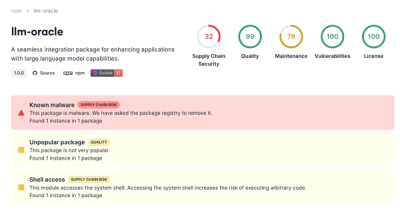Change in version 1.1.x:
facts can now be defined as being optional in a function signature by prefixing the name with an underscore. Optional facts will return null if unresolved.
clues.js
Promises provide a very effective mechanism to construct complex interactions between asynchronous functions. Most promise libraries focus on the promise object itself, and leave the actual structuring of complex logic up to the user.
clues.js simplifies structuring of long complex chains of logic by recursively and automatically solving dependencies for any given logical operation. Output of any logic is memoized in a fact table, for a quick reuse
The first secret ingredient of clues.js is the inspection of function signatures. Argument names of supplied functions are parsed and matched to corresponding facts and logic functions (by name). The second secret ingredient is the use of promises for all resolutions, callbacks and returns (using the engine/adapter of your choice).
Each argument of a logic function needs to have either a fact with the same name or a logic function with that name (if fact hasn't been determined yet). If a fact with the same name as a function argument already exists (either previously resolved, or supplied directly), it is simply passed on as an argument value to the function. If a fact is unresolved (i.e. undefined), a logic function with same name is executed to resolve the fact value, before passing it on to the original function for execution. If an argument name can neither be matched with a fact nor a logic function/value an error is raised.
Each logic function will only execute when it's input arguments values are known (as a fact). Each unknown input value will start off a logic function (by same name). When a named logic function is executed, a corresponding fact is created as a promise on the results. When the function has been resolved, the fact table is updated and the promise is fulfilled, allowing any derived functions to proceed.
Each logic function will execute only once (if at all) in an clues object. Multiple requests for the same logic will simply attach to the initial promise, and once the output is known, any further requests will simply return the resolved fact (or an error, respectively)
A clues object can be long-running, building uo/memoizing all the facts as required or a quick temporary scaffold that is discarded once a particular answer has been recursively solved from given inputs.
API Reference
clues([logic],[facts])
Creates a new clues object based on a particular logic (set of functions and values by reference) and facts (associative arrays of known values). Logic and fact objects can be defined/modified later as they are public variables of the clues object.
The logic object is used as read-only (i.e. any results will only alter fact object, not the logic object), allowing the same logic definition to be reused for multiple clues objects (each with a separate fact space). Clues object can furthermore be chained by requiring any logic function of one clues object to use .exec() function of another.
If no logic is provided to clues in a browser environment, it will use the global object (Window)
clues.solve(function(arg1,arg2...) { ... } ,[local_vars])
Supplied Function
This schedules an execution of the supplied function. The argument names of the function will be parsed and matched to facts and logic within the instance object by argument name. Any arguments that point to neither a fact nor logic (nor locals) will result in an error (unless prefixed with an underscore, making it optional). The supplied function is essentially a callback function that is executed when the inputs are known.
Local Variables
The second argument (optional) allows local variables that will be used, and have priority, against facts and logic. The is to provide the flexibility to have functions respond to request specific variables, such as a response stream or to override any previously determined facts. Please note however, that locals should really be used at end-points in logic, to ensure that locals do not contaminate derived facts.
Optional facts
By default all arguments have to be resolved for a function to be evaluated. Any fact (i.e. argument name) can however be made optional by prefixing it with an underscore. Any unresolved fact that is optional (either missing or an error) will show as undefined inside the function. The following function will fail if fact A can not be resolved, but return [fact_A,null] if fact A exists but fact B can not be resolved (or returns an error):
clues.solve(A,_B) {
return [A,_B]
}
Please keep in mind that any variable that is referred to as optional will look for the un-prefixed name in the fact/logic tables. A fact can therefore be optional in one function (name prefixed with underscore) and required in another (no prefix).
Return = promise
The solve function always returns a promise. As the main operations take place in the user supplied function, the subsequent promise might be of less interest, except for error handling.
clues.solve("name",[local_vars])
The exec function can also be called with a string name as first parameter and an optional locals object as the second parameter. This is essentially the same as calling clues exec with a function with only one variable (i.e. name) and is ideal if you need to only work with one fact variable at a time. As before if the name if prefixed with an underscore it is considered optional and returns null if unresolved.
clues.logic = {}
Key/value dictionary of logic functions and/or values. Functions in the logic object must only contain arguments names that correspond to either facts or as other logic functions/values. Each logic function must either return a value/promise, or execute a callback/resolve/error at some point with the resolved value or an error. A classical way to execute the callback is to call this.callback(err,value) ensuring that the this object passed at the top is stored as a local variable if the results are returned from a deeper scope.
this context for logic functions
There are multiple ways to initiate callbacks from a logic function, using this object. The context of this object is not the clues object itself, but an artificial context, specific to the function itself, containing the following references:
-
this.facts is a reference to the current facts object of the clues instance (should not be used really, except to overwrite other facts)
-
this.all is same as this.facts except it forces a complete exec() of all unresolved definitions in the logic object. This operation will fail unless all logic functions can be resolved.
-
this.callback is the standard callback that requires (err,value) as parameters
-
this.resolve is syntax sugar for this.callback(null,value)
-
this.reject is syntax sugar for this.callback(error,null)
-
this.local contains an object of any local variables supplied for the execution (if any)
-
this.promise contains the promise of the default deferred object used in the standard callbacks (i.e. resolve, reject etc).
Additionally we have this.success and this.fulfill aliases for resolve and this.error as an alias for reject.
Any logic function must do one of the following:
- Return a value (that will be the immediate fulfillment value of the subsequent promise)
- Return a custom promise object (the default promise object will in this be ignored)
- Return nothing (undefined) but at some point execute a callback (i.e. callback/resolve/reject).
A function that returns nothing and never executes any of the callback functions will hang (unless a timeout has been defined in the prototype wrapper).
Bonus level - this properties as reserved argument names
Most asynchronous functions lose the context of the original this object requiring the programmer to either bind functions or store this as a local that or self at the top of the function. In an attempt to eliminate this tedious requirement, all properties of this object are injected as function arguments if/when their names appear as arguments in the function signature. This obviously means that those names are reserved and cannot be used as names of facts or custom logic.
Example:
function(name,db) {
var that = this;
async.function(db,function(d) {
another_async(name,function(e,f,g,h) {
that.resolve(g)
})
})
}
can be simplified to the following:
function(name,db,resolve) {
async.function(db,function(d) {
another_async(name,function(e,f,g,h) {
resolve(g)
})
})
}
Non-functions = default values
Any logic element that is not a function will be assumed to be a default value for the same fact. This is only recommended for Global Constants, as the logic elements can be asynchronously used by different clues objects under asymmetric information (facts).
clues.as(name)
Helper that returns a node callback function and registers the corresponding promise in the fact table (by name). This helper eliminates the need to write wrappers around independent functions that can execute immediately. The execution of the clues.as() itself should not be delayed inside higher callbacks, as it registers the name within the instance object, allowing other functions to queue up for the results.
We can for example write this:
I.logic.dat = function(cb) {
$.ajax("./somefile.txt")
.done(cb)
}
simply .as this:
$.ajax("./somefile.txt")
.done(I.as("dat"))
clues.facts = {}
Key value dictionary of facts. Facts can be user supplied, determined by logic functions or both. Any fact that exists will prevent execution of logic by same name.
clues.prototype.adapter
Clues.js is designed to work with any Promise library that supports the Promises/A+ specification through adaptors. By default we use Q as it works well in the browser as well as node.js. By overwriting the prototype object (or instance property) other libraries can be easily applied.
Additionally, using the clues.prototype.adapter.defer() for any custom promises in the logic functions will ensure that if/when you change the underlying promise library, the logic code will follow suit.
clues.prototype.wrapper
Once function arguments have been resolved a function is executed. The function execution is passed through a prototype wrapper function that, by default, simply executes the function. This wrapper can be overwritten in the prototype or class objects to i.e. add timeouts and other functionality.
For database caching, external wrappers might be more efficient (i.e. wrapping each logic function) as the prototype wrapper requires all inputs to be resolved.
Hints and tips
-
Asynchronous functions must return nothing (i.e. return undefined) and call callback, resolve or reject at some point. Any function with a return value will be assumed to be synchronous (promise is fulfilled on that returned value), regardless of any subsequent calls to a callback.
-
By defining logic object as the Window object, all global functions and variables are made available.
-
Complex tree of "knowledge spaces" can be created with multiple clues object that refer to one another inside respective logic functions
-
Whenever there is high likelihood of particular information required shortly at some point, the easiest way is to execute an empty user function, with expected requirements as arguments. The logic will appear to have an clues.js for what might happen next.
-
If you want A executed before B, regardless of the results, simply include A as one of the function arguments to B, i.e. logic.B = function(A,Z,callback) { callback(..do something with Z...)}
-
clues.js does not handle multiple asynchronous requests for of a single fact (such as an an array that depends on result of multiple request). Separate counter within a logic function should be used (executing callback when outstanding requests zero) or (better yet) use queue.js to control the sub-logic.
-
This README file is now about 6 times larger than the minified library itself.



